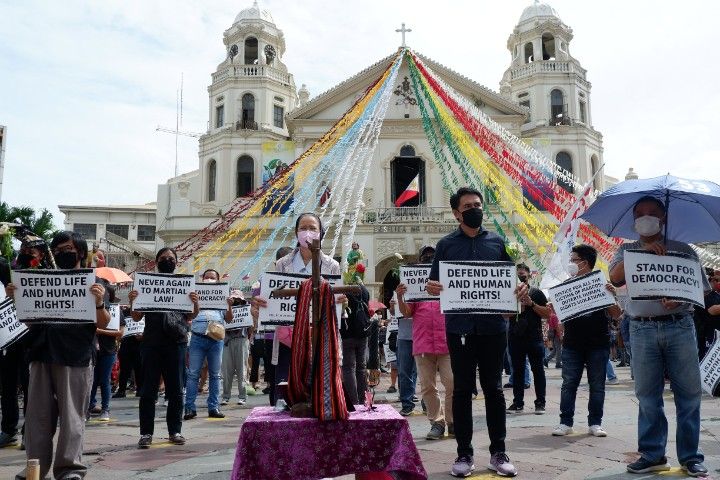NSC discourages red-tagging, vows 'more cautious, prudent' approach to insurgency

MANILA, Philippines — The National Security Council has reiterated it is turning its back on the practice of red-tagging, vowing instead a “more cautious and prudent approach” to avoid misunderstanding on the existing laws surrounding the communist insurgency in the country.
Speaking at the Pandesal Forum on Friday morning, Dr. Rommel Banlaoi, deputy national security adviser-designate of the National Task Force to End Local Communist Armed Conflict, said they would continue its efforts but with improvements and without controversial red-tagging.
“It’s unfortunate that the NTF-ELCAC has that reputation, but the ELCAC is more than the issue of red-tagging. So if there’s anything that should be stopped, it’s the red-tagging,” he said in mixed Filipino and English.
But he also insinuated that the term red-tagging was used by leaders of the communist party’s armed insurgency, saying the NTF-ELCAC would support progressive groups so long as legal, progressive groups do not aid armed insurgents.
“We should stop with the labeling. It’s lazy and we should avoid stereotyping. And red-tagging is a byproduct of those things, and it is counterproductive for good governance,” he also said.
President Ferdinand Marcos Jr. has said he would keep the National Task Force to End Local Communist Armed Conflict in government.
Banlaoi said that the incoming NTF-ELCAC would be sensitive to human rights by observing the implementation of international humanitarian law.
“That’s essential to security. How can we enjoy human security if your human rights are being violated?” he said as he assured Filipinos that any security forces violating human rights will also be punished.
Asked by one reporter about the Makabayan bloc — among the most critical voices in government which has drawn accusations of communist infiltration — Banlaoi said: “If you want to protest, that’s fine, that’s freedom of expression and that is your human right. We will encourage you to do more legal activities than armed activities.”
But referring to them as a legal front is still red-tagging, as the Makabayan bloc has already denied any links to the New People’s Army.
“For the legal fronts, there’s no problem there because you’re legal. But if there are individuals inside those organizations proven to be part of the support network that sustains the insurgency, the law will go after you,” Banlaoi said.
Why does this matter?
As the government's security adviser, Clarita Carlos will be among those behind the controversial Anti-Terrorism Council, feared by many to abuse its powers to limit dissent and undermine democracy under the pretext of countering terrorism.
She is inheriting a charged political environment that all too often leans on the widespread practice of red-tagging, defined by Philippine jurisprudence as “labeling, branding, naming and accusing individuals and/or organizations of being left-leaning, subversives, communists or terrorists (used as) a strategy... by State agents, particularly law enforcement agencies and the military, against those perceived to be ‘threats’ or ‘enemies of the State.’”
The Commission on Human Rights has warned that the practice "violates the constitutional guarantee of presumption of innocence and may have serious implications on the security and movement of individuals and groups involved."
Many activists and members of progressive and left-leaning groups have pointed out that many who are red-tagged often end up shot and killed by unknown assailants. Rights groups, including the UN Human Rights Office, have said the dangerous practice has been institutionalized in the country.
The Constitution guarantees the presumption of innocence while leaning towards the left of the political spectrum or even being a communist is not illegal in the Philippines.
- Latest
- Trending































